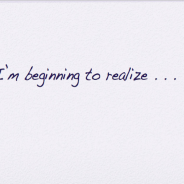The Handless Maiden: A Story for Difficult Times
In Women Who Run With the Wolves, Clarissa Pinkola Estes, a Jungian analyst and storyteller, retells a story about a handless maiden. It’s a story that seems to me a kind of ideal story for a month in which I’m writing about ways in which a person can sometimes get stuck–hit obstacles–get bewildered. The story is one that I’ve found beneficial at crucial junctures in my own life, and it’s a story I have at times told in turn to patients or students when it seems that the labor that began so well—the first giddy success of creativity and vitality—has come to a grinding halt. The story begins when a maiden loses her hands. She really does lose them—her entire hands. They’re cut off. It’s a moment of initiation. A loss of innocence. Her first serious loss. She has these stumps where she used to have hands, and she wanders, grieving, for many years. Eventually, she comes upon a pear orchard. Here, she encounters a beautiful pear—then a king. He’s a good king. He makes her a pair of silver hands and he fastens them to her stumps. They fall in love. It’s a particularly sweet kind of love for the maiden, coming as it does in the wake of grief, when she had only these stumps for hands and when she had all but given up hope. And this moment could serve, in one particular kind of story–say, a romantic story–as an ending. The king and the maiden have fallen in love. Happily ever after. Those exquisite silver hands. But this, as it turns out, is not the ending. Estes writes: . . . this is still not the lysis, resolution. We are only at the midpoint of transformation, a place of being held in love, yet poised to make a slow dive into another abyss. And so, we continue. Complications arise. The king is called to fight in a faraway kingdom. While he’s away it happens that the queen gives birth to their first child. The baby is beautiful. It’s another one of those promising moments, a joyous moment, and, in her joy, the king’s mother sends a message off to the king. The baby is well. The baby is beautiful. But, as can happen, the messenger falls asleep on his way to the king and the Devil comes and intercepts the message, twists it to his own purposes: The queen has given birth to a child who is half dog. The king, on receiving this message, is horrified. But he is a good king. And, in spite of his horror, he sends back to his mother a message of compassion, and entreaty. Please care for the queen and the baby during this difficult time. Yet once again the messenger, overly complacent, falls asleep, and, once again, the Devil intercepts the message. The king’s mother receives this twisted, and tragic, directive: Kill the queen and the child. This is the abyss. This is the time of the twisted message: The writing (or some other creative endeavor) is malformed. It’s ugly–without worth. It’s time to kill it—whatever it is. These kinds of twisted messages can arise inside one’s own head or they can arise out in the world. If such messages do arise out in the world, in...
read more


